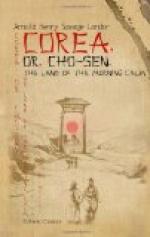[Illustration: THE KING]
It is a great mistake to suppose that the good-natured King of Cho-sen, possesses a harem as big as that of the Sultan of Turkey; indeed, the contrary is the fact. He is quite satisfied with a single wife, that is to say, the Queen. Needless to say, however, were the custom otherwise, he certainly would not be the person to object to the institution, for his predecessors undoubtedly indulged in such an extravagance. The real truth is the King of Cho-sen has married a little lady stronger minded than himself, and is compelled to keep on his best behaviour, and see to it that he does not get into trouble. There are bad tongues in Seoul who say that the Queen actually rules the King, and therefore, through him, the country, and that he is more afraid of Her Gracious Majesty, his wife, than of the very devil himself. For the correctness of this statement I will not answer.
The Queen is a very good-looking, youngish woman, younger than the King, and has all her wits about her. She is said to be much in favour of the emancipation of the Corean woman, but she has made no actual effort, that I am aware of, to modify the comparatively strict rules of their seclusion. She comes of one of the oldest families in Cho-sen, and by a long way the noblest, that of the Mins. She treats herself to countless Court ladies, varying in number between a score and three hundred, according to the wants of the Court at different times.
One of the quaintest and nicest customs in Corea is the respect shown by the young for the old; what better, then, can the reigning people do but set the good example themselves? Every year the King and Queen entertain in the royal palace an old man and an old woman of over the age of ninety, and no matter from what class these aged specimens are drawn, they are always looked after and cared for under their own supervision and made happy in every way. Every year a fresh man and woman must be chosen for this purpose, those of the previous competition being hors de concours. These privileged individuals, if devoid of means, are well provided with all the necessaries of life and cash before they are sent home; and not infrequently they end by never leaving the royal palace, or by settling in the house of some prince or magistrate, by whom they are fed and clothed till the end of their days. Of course, in many cases it happens that the oldest man or woman in the town is a nobleman or a noblewoman; in which case, after the lapse of a certain space of time, further enjoyment of the royal hospitality is politely declined.
Under the last-mentioned circumstances valuable presents are, however, given them as mementoes of the stay at the royal palace. This privilege is much thought of among the Coreans, and a family who has had a member royally entertained and treated as King’s “brothers”—for I believe that is the name by which they go—is held in great respect by the community, and in perfect veneration by their immediate neighbours.




